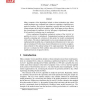Free Online Productivity Tools
i2Speak
i2Symbol
i2OCR
iTex2Img
iWeb2Print
iWeb2Shot
i2Type
iPdf2Split
iPdf2Merge
i2Bopomofo
i2Arabic
i2Style
i2Image
i2PDF
iLatex2Rtf
Sci2ools
141
click to vote
BMVC
2002
2002
Randomized RANSAC with T(d, d) test
Many computer vision algorithms include a robust estimation step where model parameters are computed from a data set containing a significant proportion of outliers. The RANSAC algorithm is possibly the most widely used robust estimator in the field of computer vision. In the paper we show that under a broad range of conditions, RANSAC efficiency is significantly improved if its hypothesis evaluation step is randomized. A new randomized (hypothesis evaluation) version of the RANSAC algorithm, R-RANSAC, is introduced. Computational savings are achieved by typically evaluating only a fraction of data points for models contaminated with outliers. The idea is implemented in a two-step evaluation procedure. A mathematically tractable class of statistical preverification tests for test samples is introduced. For this class of preverification test we derive an approximate relation for the optimal setting of its single parameter. The proposed pre-test is evaluated on both synthetic data and r...
| Added | 30 Sep 2010 |
| Updated | 30 Sep 2010 |
| Type | Conference |
| Year | 2002 |
| Where | BMVC |
| Authors | Jiri Matas, Ondrej Chum |
Comments (0)

